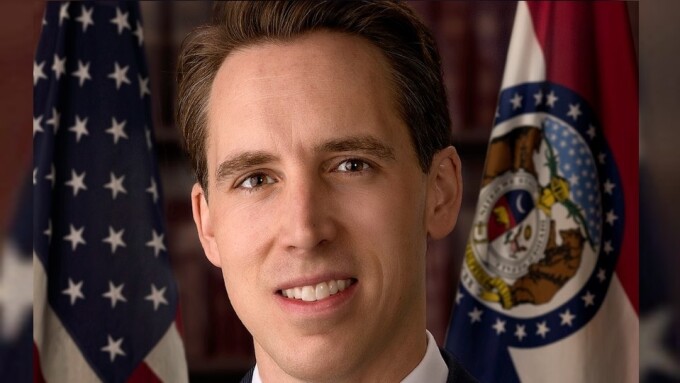WASHINGTON — Senator Josh Hawley (R-Mo.) introduced a bill today to “enable victims of revenge porn, trafficking and sexual coercion” to sue websites posting images and videos without their consent.
Hawley also referred, in a press release, to Pornhub’s core business as “spreading depraved content."
His bill is co-sponsored by Senators Joni Ernst (R-Iowa), Thom Tillis (R-N.C.) and Maggie Hassan (D-N.H.).
Hawley had announced his intention to introduce this bill via a tweet earlier this week in reaction to the New York Times editorial by Nicholas Kristof targeting Pornhub and demanding some form of state intervention against the high-profile adult platform.
Kristof tweeted his article, led by an exploitative photo of an at-risk teen in a skintight shirt, to several public officials in the U.S. and Canada.
Yesterday, Pornhub announced changes to their policies for content uploads.
Hawley’s bill, according to the Kansas City Star, “would criminalize the knowing distribution of forced or coerced sex acts, require websites to create takedown procedures to ensure victims can promptly have their images removed and empower victims to sue websites for knowingly hosting privacy-invading images and videos.”
“Sites like Pornhub routinely escape responsibility for facilitating abuse, trafficking and exploitation, making millions for themselves in the process,” Hawley said in the press release touting his own bill. “Meanwhile, the victims of this abuse have little recourse against these powerful companies, who thrive on spreading depraved content. Serious criminal penalties are needed to crack down on these tech executives who think they are above the law.”
Co-Sponsoring Senators Make Dubious 'Trafficking' Claim
The two GOP co-sponsoring Senators released statements backing Hawley's bill.
"In recent years, we’ve seen an uptick in human trafficking through pornography," said Iowa's Joni Ernst, without providing any evidence.
"Host websites that allow perpetrators to disseminate photos and video of sexual assaults or coerced sex acts on their platforms are evading the law while profiting directly from trafficking," she continued. "This bill will help empower victims of human trafficking to seek justice and put an end to the complex and heartbreaking cycle of exploitation."
Senator Tillis said, "Pornographic websites routinely post videos of women who are the victims of abuse or exploitation, and it is past time these companies are held accountable for posting this disgusting content. I am proud to co-introduce this legislation with Senator Hawley that would allow the victims of these videos to sue pornographic websites for distributing and profiting from videos that are posted without consent."
A Crusader Against the 'Sexual Revolution of the 1960s and 70s'
As XBIZ reported back in June, Hawley led a group of GOP Senators who introduced the “Limiting Section 230 Immunity to Good Samaritans Act.”
The accompanying statement by Senator Hawley stated that “for too long, Big Tech companies like Twitter, Google and Facebook have used their power to silence political speech from conservatives without any recourse for users. Congress should act to ensure bad actors are not given a free pass to censor and silence their opponents."
While Hawley appears to be against “censorship” by online platforms shielded by Section 230, his project could gut a key protection that has shielded platforms from government intrusion and lawsuits seeking to limit free expression, including sexual expression.
There is evidence that Hawley’s views on freedom of sexual expression are religiously inspired. In 2017, as Missouri’s attorney general, Hawley blamed the sexual revolution of the 1960s and '70s for “human trafficking.”
“We have a human trafficking crisis in our state and in this city and in our country because people are willing to purchase women, young women, and treat them like commodities,” Hawley told a right-wing Kansas City evangelical group. “There is a market for it. Why is there? Because our culture has completely lost its way. The sexual revolution has led to exploitation of women on a scale that we would never have imagined, never have imagined.”








